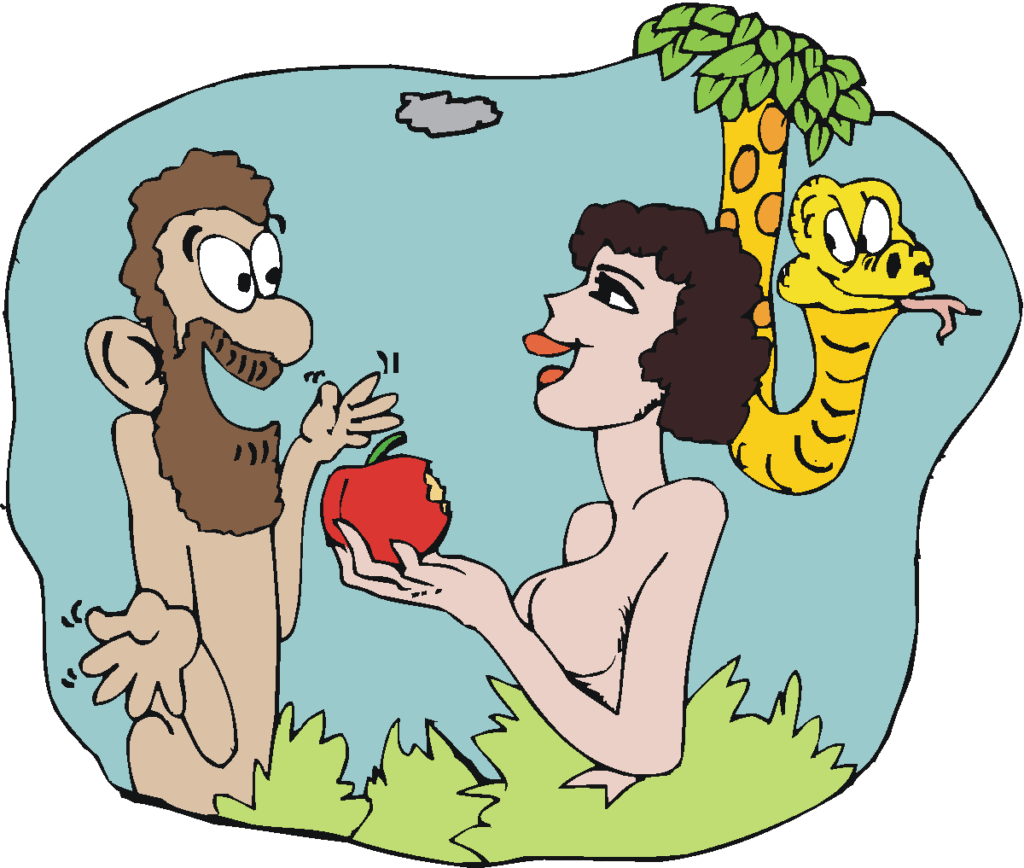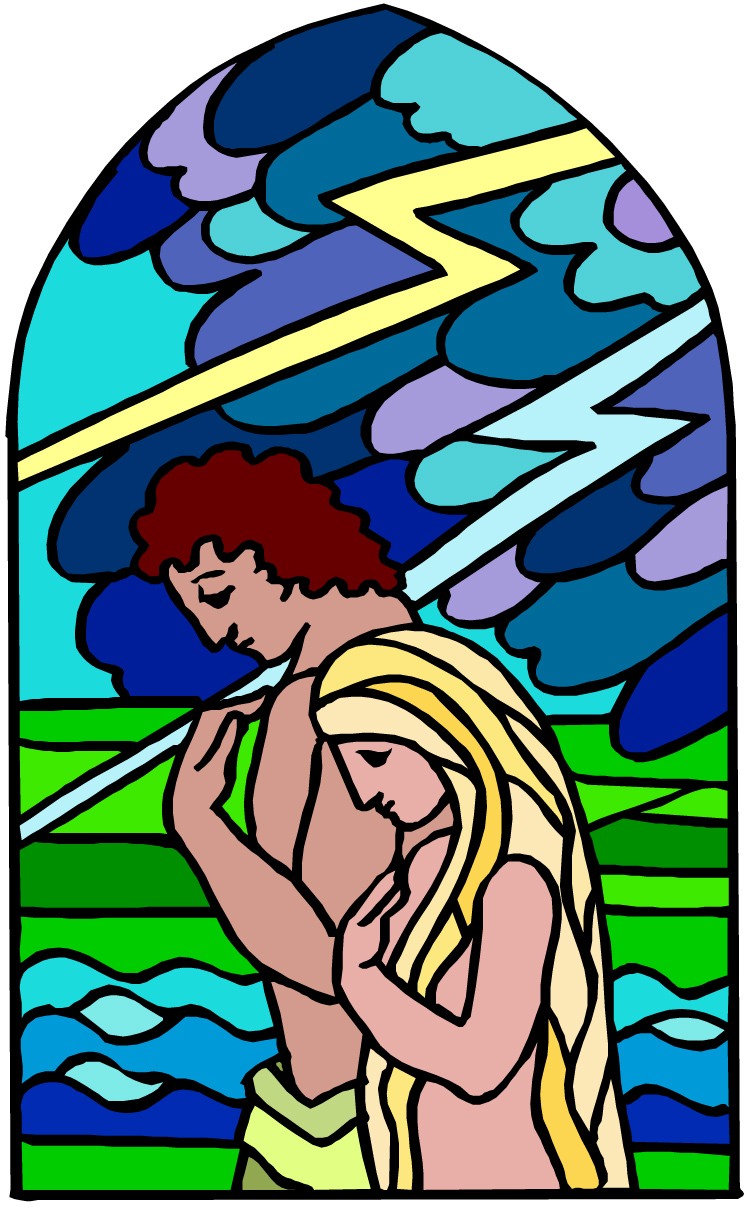
The Bible in Genesis chapter three speaks about a snake in a tree that gave the first humans a seemingly harmless fruit that when eaten would cause their eyes to be opened, so that now they would supposedly be like God and live forever. To the average person, what the serpent offered sounds like a good deal. Who doesn’t want to be like God and live forever? But beneath this ostensibly harmless and quaint Bible story, that when uncovered reveals a sinister side which is the root of all the evil that has occurred in the world from then until now. This seemingly harmless event is, in reality, the nascence of the epic and perennial struggle between good and evil that has plagued this earth from the beginning.
To comprehend fully the nature of this struggle, it is essential first to understand who the key figures are in this story, that is, who is the Protagonist and the antagonist. On the side of good is YHVH Elohim, who is a loving Father and the Creator of all there is including man, whom he created in his own image eventually be part of his spiritual family. He is the source of all goodness, beauty, righteousness, justice and truth. The Bible from beginning to end is revelation of this Supreme and Eternal Being whose name is Yehovah (or YHVH) Elohim. He his a grand and glorious plan to elevate man little-by-little from the physical level to the spiritual level, eternal level, in a similar way that a loving parent trains his or her child to become a mature, fully functioning adult.
On the other side was a serpent-like being who makes his first appearance on the earth’s stage in Genesis chapter three. To the first humans, the serpent presents alternative route to godhood. It was a way that circumvented YHVH Elohim. It was as if the serpent was attempting to kidnap the first humans to deceptively subvert them so they would turn away from their parents and go in a completely antithetical direction to the ways of their parents.
When can learn much about the nature of the pernicious serpent by examining the meaning of his biblical Hebrew name nachash—a word which is found 31 times in the Tanakh or Old Testament (OT). In the King James Bible, for example, nachash is translated as “serpent” in all cases. The Hebrew root of this word means “to practice divination, divine, observe signs, learn by experience, diligently observe, practice fortune-telling, take as an omen.” Nachash is almost identical to the Hebrew word for copper or bronze, and some scholars think that the two words are related because of the color, since some snakes are copper in color (i.e., America’s copperhead snakes). A cognate of these two words is n’hushtan, which is the bronze serpent that Moses made (Num 21:9–9). The LXX (the Greek translation of the OT translated nachash as ophis, the Greek word for snake, in all instances (see The TWOT). Although this passage doesn’t relate the serpent to Satan, the adversary, John makes this connection twice in Revelation (Rev 12:9; 20:2).
But there is even more to the word nachash as biblical scholar Michael Heiser points out. The meaning of nachash is both plain and elastic. The most literal meaning is “serpent.” When the Hebrew root letters n-ch-sh are a noun, the meaning is “serpent.” But n-ch-sh can also be a verb when different vowels are added (i.e., nochesh). It then means “diviner.” “Divination refers to communication with the supernatural world. A diviner in the ancient world was one who foretold omens or gave out divine information (or oracles)” (The Unseen Realm, p. 87). The consonants n-ch-sh can also form an alternate noun referring to copper or bronze smiths. Nechosheth is the Hebrew word for bronze and copper, which are shiny when polished, and which can be used to describe divine beings (Dan 10:6; ibid.). In the case of n-ch-sh in Genesis 3:1, Heiser believes that the writer wants the reader to think of all the possible meanings and nuances of the word. As such, he suggests that there are immediate clues in the story that the serpent is more than a mere snake, that he may be a divine adversary, and that the term nachash may be a triple entendre. Elsewhere, Scripture refers to the serpent as a cherub, a divine being who was a guardian of Elohim’s throne (Ezek 28:16 cp. Exod 15:18–22).
So how does this serpent-like, divine being who is advertorial in nature relate to our Genesis chapter three story and his tempting of the first humans to rebel against YHVH Elohim? It is this serpent-cherub who dispenses divine information used to lure Eve into sin, when he gave her the omen that if she ate of the fruit of the forbidden tree of knowledge that she wouldn’t really die, that her eyes would be opened and that she could be like Elohim without having to obey his instructions. Moreover, the serpent-cherub’s shiny appearance conveyed a divine nature, making the serpent more credible and believable. All of these meanings of n-ch-sh are consistent with what Genesis 3, Isaiah 14 and Ezekiel 28 reveal to us about the serpent (ibid, pp. 87–88).
Why is this background information so important in understanding the religion of secular humanism? This is because the first few verses of Genesis chapter three reveal that Satan, as YHVH’s arch-adversary is the originator of all the counterfeit religious systems of the world which are direct opposition to the truth of Elohim as revealed in the Bible. How is this? Let’s first review this passage of Scripture and then explain what we mean and how this is so. From the tree of the knowledge of good and evil, the following drama played out:
Now the serpent was more cunning than any beast of the field which the YHVH Elohim had made. And he said to the woman, “Has Elohim indeed said, ‘You shall not eat of every tree of the garden’?” And the woman said to the serpent, “We may eat the fruit of the trees of the garden; but of the fruit of the tree which is in the midst of the garden, Elohim has said, ‘You shall not eat it, nor shall you touch it, lest you die.’ “Then the serpent said to the woman, “You will not surely die. For Elohim knows that in the day you eat of it your eyes will be opened, and you will be like Elohim, knowing good and evil.” (Gen 3:1–5)
As we are about to discover, all of the world’s religious systems and man-made philosophies fall under the power and influence of the serpent’s lies that originated in the Garden of Eden at the tree of knowledge. These false system can broadly be defined as secular humanism.
What is secular humanism and how does the devil use it to further his rebellious opposition to Elohim? At its core, secular humanism (as defined by Francis Schaeffer in his book The Great Evangelical Disaster, p. 32) is freedom from all restraint and especially rebellion against Elohim’s biblical truth.
When Satan originally rebelled against Elohim, he attempted to dethrone the Creator and lift himself up in Elohim’s place (Isa 14:12–14). Here in the Garden of Eden, Satan the serpent employed the same subversive tactics as in his original, earlier rebellion. He attempted to subvert the will of the Creator by calling into question the character of Elohim to Adam and Eve. This was an attack against the character of the Creator. In modern terms, we refer to this as an ad hominem attack, where you attack a person’s character rather than addressing the facts of the issue at hand. In this way, the serpent successfully lowered man’s esteem for Elohim, and at the same time elevated man’s esteem for himself at Elohim’s expense. The biblical record reveals that this is a standard attack technique of Satan. He continually pits the forces of his kingdom behind anything that will compromise the authority of Elohim by attacking the character of the Creator. Once the Creator is diminished if not eliminated from the scene in man’s thinking, it is upon this false foundation of evil lies, that the devil can then construct his own counterfeit kingdom that is in opposition to that of YHVH Elohim. The most notable example of this false (antichrist) kingdom is found in Revelation 13 where an end times worldwide system is described called Mystery Babylon the Great. There in a vision, John sees this false system likened a series of monster-like creatures, empowered by Satan, which stand in defiant opposition to Elohim. Similarly, in the end times, Satanic forces will infiltrate the Christian church and plant doctrines of demons and seeds of rebellion against the Word and will of Elohim (1 Tim 4:1).
Secular humanism at its most fundamental level seeks to dethrone Elohim as the Creator, Ruler, Lawgiver and Judge if not to eliminate him all together from having any influence in the affairs of men, and if possible, to relegate his memory to the trash of history as ancient fables contrived by primitive humans.
Humanism promotes the notion that now that Elohim has been dethroned, and man can now place himself on the throne of his life, thus usurping Elohim’s authority. This is all under the power and influence of Satan, of course, whether man is aware of this or not. Satan cares little if man sees him as the driving force behind this subversive movement, just as long Satan ultimately remains in charge.
At the core of humanistic philosophy is the assumption that man is innately good and sinless, instead of sinful and morally depraved as the Bible teaches. If man is the paragon of goodness and not evil, then he is now qualified to be the sole determiner of what is good and evil. Now, who needs an Elohim telling him what to do? Each person for himself is now the determiner of what is good and evil, hence the name the tree of the knowledge of good and evil. With Elohim out of the picture, man can now choose for himself what is good and evil. Schaeffer describes secular humanism this way.
[It is] a consensus that stands in total antithesis to the Christian truth at every point—including the denial of the supernatural; belief in the all-sufficiency of human reason; the rejection of the fall [of man into sin]; denial of the deity of Christ and his resurrection; belief in the perfectibility of Man; and the destruction of the Bible and with this has come a total moral breakdown” (Evangelical Disaster, pp. 35–36).
Schaeffer calls humanism “a fundamental conflict between ‘the wisdom of this world’ and the ‘wisdom of Elohim.” As previously noted, Satan is the originator and prime instigator behind the anti-Elohim religious philosophy of secular humanism. Satan’s rebellion against his Creator is characterized by the five “I will” statements of Isaiah 14:13–14, and which are summarized by his final assertion: “I will be like the Most High.” At the tree of knowledge, Satan disguised as a serpent successfully conned man into buying into this same idea that man can be like Elohim by rebelliously disregarding the Word of his Creator (Gen 3:4). To this day, the proponents of the secular humanist philosophy adhere to the idea that man is his own god, and that Elohim is either non-existent or, if he does exist, is irrelevant. Either way, man is his own god, is at the center of the universe, is the sole determiner of what is right and wrong, and in no way needs Elohim for anything, nor is man answerable to any Supreme Being for his actions.
Continue reading



